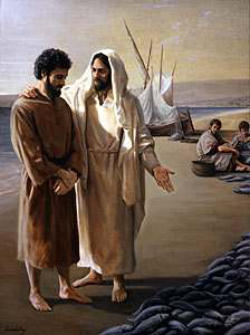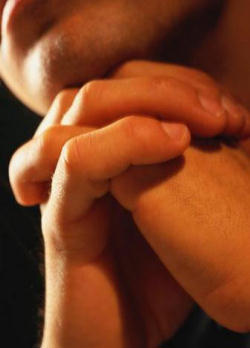
In the post resurrection account recorded in St. John’s Gospel we read this account of an extraordinary encounter between the Risen Jesus and Peter:
“When they had finished breakfast, Jesus said to Simon Peter, “Simon, son of John, do you love me more than these?” Simon Peter answered him, “Yes, Lord, you know that I love you.” Jesus said to him, “Feed my lambs.” He then said to Simon Peter a second time, “Simon, son of John, do you love me?” Simon Peter answered him, “Yes, Lord, you know that I love you.” Jesus said to him, “Tend my sheep.”
“Jesus said to him the third time, “Simon, son of John, do you love me?” Peter was distressed that Jesus had said to him a third time, “Do you love me?” and he said to him, “Lord, you know everything; you know that I love you.” Jesus said to him, “Feed my sheep. Amen, amen, I say to you, when you were younger, you used to dress yourself and go where you wanted; but when you grow old, you will stretch out your hands, and someone else will dress you and lead you where you do not want to go.” He said this signifying by what kind of death he would glorify God. And when he had said this, he said to him, follow me.” (John 21)
As the years have unfolded this encounter between Peter and the Lord has taken on so much meaning for me. How do we respond to the inevitable struggle, failure, disappointment and difficulties in life? How do we recover when we have fallen?
There are some who insist that obstacles, struggle and pain are opposition from the enemy of our souls, the devil. Well, evil is real and, because we are joined to the Lord through our Baptism, we do encounter attacks as we participate in the spiritual warfare that is arrayed against His loving plan.
Yet, the truth is that difficulties and struggle are more often than not simply a part of the human experience. They are rooted in the rupture in the order of the world that was caused by our individual and corporate separation from God resulting from sin.
There are others whom I have referred to in the past as “friends of Job.” Like the “friends” of that great figure of the Old Testament, they blame difficulties and struggle on the behavior of the one who is experiencing them, accusing him or her of not “having faith” or not doing the right thing.
These folks speak as though they have God figured out, as though He were some kind of puzzle to be solved. They present the Christian faith as though it were a formula to be followed rather than a gift and mystery to be received. They minimize the Christian vocation as a call to some form of “success”, rather than a rugged road to be walked in the footsteps of a Savior whose greatest act of Love was deemed by most who witnessed it to be a complete failure.
Let’s be honest. Life is often difficult, even when you are praying, being as faithful as you can be, cooperating with grace and really believing in the Lord and all that he teaches through His Church. Pain, failure, opposition, hardship, struggle, disappointment all just seem to be a part of the program.
In fact, the great saints of old, such as St. Paul, grew so accustomed to difficulties he began to “boast” of them, writing to the Church at Corinth. “I will rather boast most gladly of my weaknesses, in order that the power of Christ may dwell with me. Therefore, I am content with weaknesses, insults, hardships, persecutions, and constraints, for the sake of Christ; for when I am weak, then I am strong.” (2 Corinthians 12:9, 10)
The question that we should ask ourselves when we face struggle, difficulty, failure, disappointment and the frequent pain of real life is how will we respond to the invitation that they offer to us? Every difficulty, struggle and experience of opposition or pain is an invitation to exercise our freedom, informed by our faith, to truly believe in and embrace the loving plan of God.
To the man or woman who is sincerely committed to following the Lord, embracing these experiences in the surrender of authentic discipleship paves the path to holiness, forms the raw material for continued conversion and equips him/her more fully for the work of the Gospel.
When I enter into the inevitable times of struggle in my efforts to live my life now, in the Lord, I always return to this last Chapter of St. John. John’s is the “theological” gospel. Probably the last to be written, it reveals the mature reflections of the early Church concerning the deepest meaning of the Incarnation, life, death, resurrection and teaching of Jesus Christ the Messiah.
In that last chapter of his beautiful Gospel, the “beloved disciple” John records this third time that Jesus appeared to the disciples in great detail. He focuses on its effect upon the forlorn leader of the early band of disciples, Peter. This Peter is the one who, as the Master Himself prophesied, had denied the Lord during the final hours. Now, he is invited to respond to the gaze of Love and hear again the call of the Risen Lord to begin again.
The early Fathers of the Church drew such beautiful insights from the three questions asked by the Risen Lord, as well as from Peters three fold response. They taught that this dialogue represented both the undoing of his former threefold denial and an affirmation of his specific call to leadership over the early Church as it went forth into the Nations to carry forward in time the redemptive mission of Jesus.
How rich and beautiful this insight truly is. It reaches down to the depth of the mystery of human freedom. As the Catechism of the Catholic Church so succinctly expresses “Mortal sin is a radical possibility of human freedom, as is love itself” (CCC #1861)
Sin is an abuse of freedom, a wrong choice. When we choose against God, we choose against love, and we choose against our own human flourishing. When we make these kinds of wrong choices, we not only negatively affect the world around us, but we change who we become in the process. Peter’s denial crippled Peter. He lost his way. We do as well.
The only path out of his plight was repentance and, then, making a new choice, one that was rooted in faith and trust rather than fear. The Risen Jesus came and stood in front of Him, gazing upon Him in love, showing Him the way of new life. He does the same for each one of us.
Our repentance for our sin invites us to make new choices of love and fidelity in both word and in deed; to begin again. We are always invited to exercise our freedom when we are faced with difficulties and struggles. The right choice, made possible by grace, is to choose the way of surrendered love, like the Apostle Peter. The sentence immediately following Peters’ three fold response to the Lord in St. Johns’ Gospel is the one that has taken on a deeper meaning to me as I grow older.
In another translation the verse reads: “I tell you for certain that when you were a young man, you dressed yourself and went wherever you wanted to go. But when you are old, you will hold out your hands. Then others will wrap your belt around you and lead you where you don’t want to go.”
This is what I mean by the phrase ‘brotherhood of the belt’. I have learned that there really is no substitute for time, for aging. It truly is meant to be a tutor, when received as a gift. I am in a season of my life chronologically where I know that I no longer want to get out ahead of the Lord. I feel as though the Lord has tied a belt around me and He is pulling me. I have found a great source of freedom in simply letting Him do so.
I am not complaining. In fact, I know that this is right where I should be. It is also becoming where I want to stay. What changes more often in my life these days are not the circumstances that surround me but the way I view them and the manner in which I respond. In short, I am changing; it is the kind of change that is not easy, but I know must happen.It is the path to true freedom.
What once seemed sour now tastes sweet. What once caused fear now invites a deepening call to faith and surrender. Perhaps you are having similar experiences in your own life? If so, take Peter as an example and a source of encouragement. Let go of any attempts to control. Join the brotherhood (or sisterhood) of the belt.
Let Jesus pull you along in the way of surrendered love. There is no better way to live.

